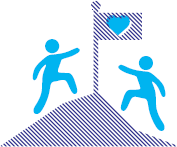
“Business-based solutions are more sustainable and empowering than aid or a handout.”
Part Two: Chapter 12Open New Markets
By Craig Kielburger
Think outside the box store
Many great athletes are restless and unhappy in retirement, unable to replace the thrill and adulation they knew as stars. Earvin “Magic” Johnson had a national collegiate title, five NBA championship rings, and an Olympic gold medal on his résumé when he quit pro sports. Regular life seemed destined to be dull by comparison. But unlike so many of his contemporaries, Johnson had a social mission, which drove him to find his footing off the court after he retired in 1996. Diagnosed with HIV in 1991, he launched The Magic Johnson Foundation to finance HIV/AIDS awareness campaigns, prevention, testing, and treatment. By announcing his positive status at a time when few understood HIV/AIDS, Johnson likely did more to combat the stigma surrounding the disease than any public awareness campaign at the time. His foundation also tackled the education gap in America, offering Internet access, computer training, and college scholarships to underprivileged students. It was Johnson's involvement with the urban poor—his understanding of inner-city America—that led him straight to a business opportunity that everyone else had strolled right past. Having grown up in a poor but hardworking family in the economically depressed ...
Get WEconomy now with the O’Reilly learning platform.
O’Reilly members experience books, live events, courses curated by job role, and more from O’Reilly and nearly 200 top publishers.

